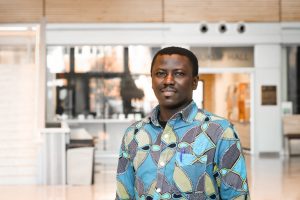Joseph Akowuah: From Ghana to Iowa, and Back
Author: Sarah Hays
Author: Sarah Hays
From Ghana to Iowa, and back, Joseph Akowuah, senior lecturer at the Kwame Nkrumah University of Science and Technology (KNUST) Department of Agricultural and Biosystems Engineering has been cultivating a relationship with Iowa State University’s Department of Agricultural and Biosystems Engineering for years. Now, he has just completed his first in-person visit to Iowa State, where he conducted a seminar that highlighted the potential areas for collaborations between ISU ABE and KNUST’s ABE departments.
“For about five or six years, I have had the opportunity to work with professor Dirk Maier here,” Akowuah said. “We have had the opportunity to work together on projects between KNUST and ISU, and we have a lot in common.”

According to Akowuah, he and Maier have been working with students from Engineers Without Borders (EWB), KNUST and ISU Chapters on projects in Northern Ghana.
“This collaboration allows students to take what they learn in class and transfer it to real life where mentors guide them,” Akowuah said. “The students develop their confidence and learn how to practice the profession. It has been very encouraging to see students so interested in what we are doing.”
From water quality to environmental health and more, Akowuah has worked with ABE professor Dirk Maeir to combine their knowledge and improve agriculture in Northern Ghana in the Ullo Traditional Area.
Akowuah and Maier are working on several research projects. One is a rainwater catchment project providing the ability to harvest rainwater to save for dry spells, and another is improving air quality and reducing smoke in kitchens so the cooks can have better health. The team is also building a clinic facility for the community and improving water accessibility for the Ullo Senior High School so the students don’t have to travel far to access water.
After working together for the first two years, Maier traveled to Ghana with ISU Students through the EWB organization. Now, ISU EWB members virtually work with students in Ghana to improve agriculture. So with a visit from Akowuah, they were able to connect in person and better understand their research.
Throughout Akowuah’s visit, he has also had the opportunity to meet with industry leaders in Iowa. Experiencing the industry in action was a big opportunity and a huge takeaway from his trip here, he said.
“It is not common to find big agricultural companies in Ghana involved in the manufacture of agri-related products like dryers, silos etc,, so being able to see the scale of the production here is eye-opening and impactful,” Akowuah said. “When I go back and teach students, I can show photos and share the real life experience with them.”
But overall, Akowuah says that the best part is providing a broader understanding to the students here in Iowa.
“The students here in Iowa are working on projects in Ghana, so for them to understand in person from the perspective of a Ghanian, me being here has given them the leverage to ask questions and allow me to explain and help them continue the project,” Akowuah said.